Grape Juice Benefits: 11 Science-Backed Health Perks
From boosting heart health to digestion — this antioxidant-rich drink is highly nutritional.
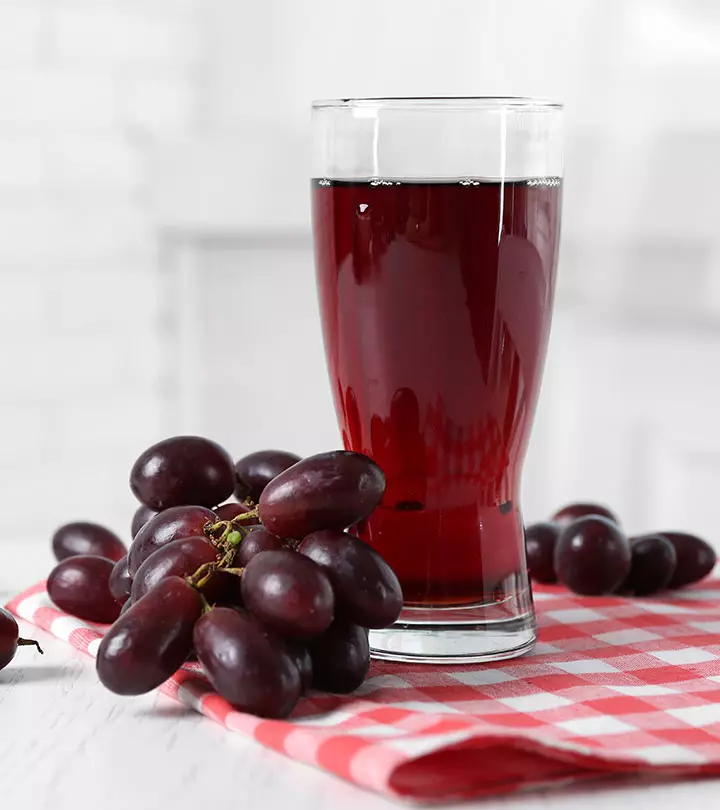
Image: Shutterstock
The world has known grapes (Vitis vinifera) for their medicinal value for over 6000 years. The Egyptians introduced the use of grapes and grapevines in medicine. The sap from grapevines was made into ointments to treat skin and eye conditions (1).
Grapes and their ripened fruit juices were used to control a variety of ailments, like nausea, constipation, cholera, smallpox, liver disease, and even cancer (1).
Recent epidemiological studiesi A branch of study that deals with the pattern and causes of health-related events occurring in a select group of people. also reinforce the cardioprotective nature of these fruit extracts (1).
Research supports the potent antioxidant properties of grapes. Grape juice happens to be the new-age detox drink. Keep reading to discover the therapeutic benefits of grape juice.
 Know Your Ingredient: Grape Juice
Know Your Ingredient: Grape JuiceWhat Is It?
A drink extracted from grapes (Vitis vinifera).
What Are Its Benefits?
It boosts memory, helps burn body fat, aids detoxification, and improves cardiovascular and gut health.
Who Can Consume It?
People who have constipation can benefit from it.
How Often?
Regularly, but in moderation.
Caution
Avoid it if you are receiving any blood thinning medication.
In This Article
What Are The Benefits Of Drinking Grape Juice?
Is grape juice good for you? Yes, grape juice has antioxidant and anti-inflammatory properties. It may control hypertensioni A condition where the blood flow pressure causes a strain on the arterial walls, causing high blood pressure or hypertension. and aging. It may also help in managing and avoiding prostate complications and digestive issues. Here are its benefits in detail.
1. May Protect Heart Health
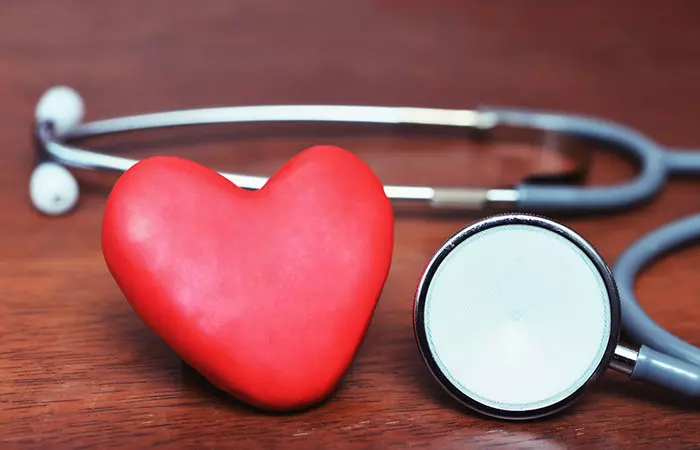
Grapes are packed with antioxidants. Phytochemicals like resveratrol and quercetin, procyanidins, tannins, and saponins are a few antioxidants known to protect your heart health. Research states that grape juice is as therapeutic as grapes (2).
Red and purple grape juices reduce the stickiness of platelets (platelet aggregation), which is a key factor in blood clotting (2).
Grape juice also increases the levels of good cholesterol (HDL). It reduces inflammation in the blood vessels and improves their ability to relax (vasodilation and relaxation) (1).
Human studies show that drinking grape juice (especially Concord grape juice) can control systolic blood pressurei The first number in blood pressure reading that indicates the pressure in the arteries exerted by the flow of blood. , especially if you have hypertension (3).
The consumption of purple grape juice stimulated the release of anti-inflammatory indicators like nitric oxide in patients with coronary artery disease. Drinking the juice for 2-4 weeks improved the blood flow through arteries and also lowered the bad cholesterol (LDL) levels (1).
2. May Slow Down Memory Loss In Older Adults
Grape juice from the Concord variety contains antioxidant and anti-inflammatory properties. It may influence and improve neuronal signaling. Consuming this juice may reduce the risk of dementia (4).
In a randomized trial, 12 older adults with memory decline were kept on Concord grape juice supplementation for 12 weeks. Researchers observed an improvement in their cognitive behavior, verbal learning, and spatial recallingi A person's ability to remember and recall certain locations and their spatial relationships, like navigating your hometown. (4).
Active polyphenols like resveratrol affect the memory centers in your brain, like the hippocampus. Rats that received resveratrol showed an apparent boost in learning, mood, and spatial memory. In contrast, their placebo-receivingi A group of patients that receive a fake drug to test the effects of the drug against those who receive the real drug. counterparts had a decline in the ability to make new memories (5).
Such studies prove that resveratrol-containing grape juice can be an excellent brain tonic. With further research, it may be applied to manage Alzheimer’s disease, early dementia, and other chronic neurodegenerative disordersi A wide range of disorders that are caused due to damage or the loss of structure or function of the nerve cells. (5).
3. May Manage Blood Glucose And Diabetes
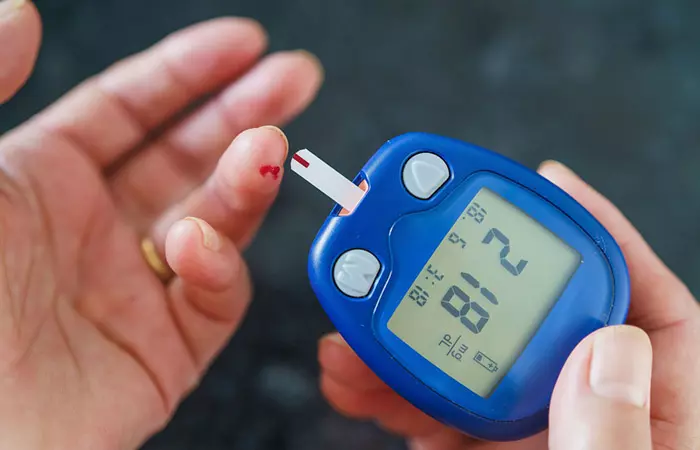
One of the major causes of diabetes mellitus is oxidative stress. Consuming Concord grape juice may reduce insulin resistance. It contains anthocyanins, proanthocyanidins, flavonols, phenolic acids, and resveratrol. All of these are potent antioxidants (6).
They eliminate free radicals that cause inflammation of insulin-secreting pancreatic cells. The grape polyphenols work on impaired glucose tolerance in tissues (6). This is supposed to be the initial stage of diabetes.
In a randomized, controlled study, 250 mg/of resveratrol per day was administered orally to 62 patients with type 2 diabetes. Over three months, positive changes in their fasting glucose concentration were observed. The HbA1c level (which is a blood sugar level indicator) was also within the normal range (7).
However, you need to watch out for added sugar in packed grape juices. Added sugars can drastically reduce the benefits of having the juice.
4. May Have Anticancer Properties
Consuming purple grape juice may inhibit DNA damage that helps in cancer prevention.
A study conducted in Korea showed the effects of regular grape intake on DNA. Healthy participants had reduced levels of oxidative DNA damage in immune system cells. Grape juice also increased the plasma antioxidant capacity in them (8).
Grape phytochemicals were found to be effective in killing colon cancer cells. How they selectively work on cancer cells is still being studied. However, there was a drop in the incidence of tumors in rats fed with grape extracts (9).
Administering flavonoid-rich grape juice can manage chemotherapy-induced nausea, vomiting, and other side effects. The results of these studies turned out to be inconclusive. But with more supporting data, drinks like grape juice can be considered a cheaper alternative to chemotherapy adjuncts (10).
5. May Help Mitigate Prostate Issues
Prostate cancer and related issues are a leading cause of low quality of life and mortality in men. Laboratory studies demonstrate the anticancer properties of grape juice and wine on prostate cancer cells (11).
Human studies have shown that dietary supplementation of grape juice (480 ml/day) can reduce DNA damage without major side effects. The juice could reduce the formation of free radicals by almost 15% in eight weeks (11).
Muscadine grape extracts have been studied extensively for their prostate-protective properties. Evidence supports the selective apoptosis (programmed cell death) of prostate cancer cells triggered by grape anthocyanins. Surprisingly, healthy cells remain unaffected (12).
6. May Promote Gut Health And Digestion

Adding grapes to your diet with high-fat foods changes your gut microbial environment drastically. Despite having limited absorption and digestion, grape polyphenols protect your gut against pathogens, oxidative stress, and inflammation (13).
The polyphenols in grape juice may control glucose intolerance and aid weight management. These phytochemicals also lower intestinal inflammation by inhibiting the production of inflammatory markers (TNF-α, IL-6, lipopolysaccharide, etc.) (13).
Grape polyphenols also promote gut barrier integrity. They promote the growth of helpful intestinal bacteria like Akkermansia muciniphila. This can enhance digestion and assimilation (13).
According to mice studies, grape extracts can protect you from pathogenic gut infections, metabolic disorders, and obesity (13).
7. May Inhibit Flu And Enteric Viruses
Laboratory and animal studies report the antiviral properties of grape juice.
The resveratrol in grape juice prevents the reproduction and spread of the influenza virus. It seems to block host cell functions that are vital for viral replication (14).
It interferes with the manufacture of proteins made in the viral replication process. Resveratrol treatment increased the survival of treated mice by 40%. More importantly, there have been no reports of toxicity (14).
The acidic-neutral pH of grape juice also helps prevent viral infections. Commercial grape juice was found to inactivate various enteric virusesi These viruses are easily transmitted from one person to another through the fecal-oral route. and herpes simplex virus (HSV). Moreover, grape juice treatment showed a 1,000-fold reduction in poliovirus infectivity (15).
8. May Help You Burn Fat
Moderate doses of red grape juice or wine may help you burn fat. White grape seed flour was found to be more effective in managing obesity and metabolic diseases like fatty liver (16).
The ellagic acid in Muscadine grapes dramatically slowed down the growth of existing fat cells and the formation of new ones (adipogenesis) (17).
Overweight mice that were given small, decent-sized doses of these grape drinks showed improved liver function. Ellagic acid and other chemicals trigger the genes that control the metabolism of dietary fat and glucose. In these experiments, the blood sugar levels of mice were also under control (18).
Scientists hypothesize that if experimental models showed a positive response to grape drinks, those who are overweight may also benefit from them (18).
Ameryca Freeman, a vlogger, shared her experience of fasting with grape juice for 3 days in her vlog. She said, “I used to be 118 pounds of that Sunday I had started and by Wednesday when I finished, I was 115 pounds (i).”
9. May Protect And Nurture Your Skin

Red wine, grape juice, cranberries, peanuts, and their products contain resveratrol. Resveratrol acts as an antioxidant and anti-mutagen with anti-inflammatory effects.
Resveratrol inhibited tumorigenesis (formation of tumors) when administered to mouse skin cancer models (19).
Numerous mice studies demonstrate the photoprotective propertiesi Properties that help organisms protect themselves against the harmful effects of UV rays from the sunlight. of this grape phytochemical (19).
The topical application of resveratrol may inhibit skin edema caused due to exposure to UVB rays. It causes a significant decrease in the generation of free radicals (like hydrogen peroxide) that may trigger aging and skin cancers (19).
Grape juice contains fair amounts of hydrolyzed collageni Refers to collagen molecules that have been broken down into digestible particles and are easy to incorporate into other products. and that’s why It is considered one of the best juices for glowing skin. Consuming such drinks, about 5–10 g a day, for 3-6 months, may enhance overall skin health (20).
10. May Detox Your Body
Grape juice can be an alcohol-free alternative to red wine. Making it a part of your diet introduces antioxidants into your body. These combat oxidative damage to your DNA and body (21).
11. May Enhance Immune Function
High concentrations of vitamin C and other antioxidants found in grape juice help the immune system by fighting off infections and lowering inflammation (22). Regular intake may improve general health by strengthening the body’s defenses and improving the healing process from illness.
Grape juice can prevent/delay the onset of heart disease, diabetes, obesity, stroke, neurodegenerative disorders, and cancer by scavenging free radicals (23).
 Trivia
TriviaAll the various ways grape juice benefits your health are attributed to its nutrient profile. Its phytochemical composition is another contributor. Resveratrol, quercetin, catechin, flavonols, anthocyanins, gallic acid, and epicatechin are the key elements. Let us take a look at how much of each is present and how they are distributed.
Key Takeaways
- Grape juice may help improve heart and liver health with its antioxidant content.
- It may reduce the risk of dementia as it has anti-inflammatory and antioxidant properties.
- The phytochemicals in grape juice may lower intestinal inflammation.
- Drinking red grape juice may help you burn fat and lose weight.
Grape Juice: Nutrition Details*
The values in the brackets include the daily value of the particular nutrient the serving of the ingredient meets.
Grapes contain a variety of phytochemicals, including phenolic acids, stilbenes, anthocyanins, and proanthocyanidins (24). Their composition varies significantly among subspecies and species.
 Trivia
TriviaThe distribution of these phenolic components in grapes is as shown below:
| RESOURCE | PHENOLIC COMPOUNDS |
|---|---|
| Seed | Gallic acid, (+)-catechin, epicatechin, dimeric procyanidin, proanthocyanidins |
| Skin | Proanthocyanidins, ellagic acid, myricetin, quercetin, kaempferol, trans-resveratrol |
| Leaf | Myricetin, ellagic acid, kaempferol, quercetin, gallic acid |
| Stem | Rutin, quercetin 3-O-glucuronide, trans-resveratrol, astilbin |
| Raisin | Hydroxycinnamic acid, hydroxymethylfurfural |
| Red wine | Malvidin-3-glucoside, peonidin-3-glucoside, cyanidin-3-glucoside, petunidin-3-glucoside, catechin, quercetin, resveratrol, hydroxycinnamic acid |
*Source:USDA
Nutritional Profile Of Grape Juice
According to the U.S. Department of Agriculture, 100 gms of purple grape juice contains (25):
- Energy: 66 kcal
- Protein: 0.26 g
- Fat: 0.29 g
- Carbs: 15.6 g
- Sugars: 14 g
- Nitrogen: 0.04 g
- Citric acid: 110 mg
- Malic acid: 228 mg
- Calcium: 10 mg
- Potassium: 50 mg
- Sodium: 4 mg
- Vitamin C: 45.6 mg
Grape juice is rich in nutrition. But could it be the ideal alternative to red wine?
Grape Juice Vs. Red Wine
Both grape juice and red wine are extracts of the same source. Their phytochemical makeup differs slightly. Grapes contain a wide variety of polyphenol compounds, including flavonoids, phenolic acids, and resveratrol. These contribute to its health benefits (1).
The highest concentrations of grape polyphenols are found in its skin, stems, and seeds. Hence, the longer the contact with these components, the higher the polyphenolic content (1).
During the production of red wine, there is prolonged exposure to the skin, stem, and seeds of grapes. This increases the polyphenolic content up to 10-fold compared to white wine and grape juice (1).
That brings us to the French paradox.
The French Paradox
The WHO collected data on cardiovascular mortality from 17 Western countries, including the United States and the United Kingdom.
Interestingly, the French were found to have a lower risk despite higher consumption of saturated fats. This finding was called the “French Paradox.”
On further analysis, they concluded that increased consumption of wine in France and other Mediterranean countries could be the rescuing factor.
Initially, people thought it was the alcohol content that lowered cardiovascular disease risk. However, other studies indicated that non-alcoholic factors in wine may also play a protective role.
Only when the researchers understood the existence of polyphenols, the French paradox stood better justified.
Simply put, grape juice is the non-alcoholic (more or less) equivalent of red wine. It still does a fantastic job of healing and protecting your body.
You can buy ready-to-serve bottled grape juice or make a fresh batch of grape juice at home by diluting grape juice concentrate as per the instructions.
If you wish to make grape juice at home, we can help you with the basic recipe(s). You can play around and add other flavors to it.
What You Need
- Organic grapes (Concord/Muscadine/black/red/green): 750g to 1 kg (for 3-4 servings)
- Water: as required
- Optional seasonings
- Black salt: 2-3 pinches
- Jaggery/sugar/sweetener: as required
- Lemon juice: 1 teaspoon
Let’s Make It!
Method 1: Using An Electric Blender
- Wash the grapes thoroughly under running water. Drain them.
- Add them to the blender. Blend until you get a smooth mixture.
- Using a strainer, strain the contents into a clean and dry colander/container.
- Use a spoon to press the pulp against the strainer to squeeze out the remaining juice.
- Add the lemon juice, salt, and sweetener (if the juice is not sweet enough).
- Serve it with a few ice cubes and a garnish of grapes and mint leaves.
- Drink it fresh with your breakfast to kick-start your day and detox your body!
Method 2: Without Using An Electric Blender
- Wash the grapes thoroughly under running water. Drain them.
- Transfer them to a colander and wash them in warm water. This step ensures chemicals/pesticides on the grapes’ surface are washed off. Drain them.
- Mash all the grapes using a potato masher until their juice begins to come out.
- Put the mashed grapes in a boiling pot with water.
- Cook them on medium heat for around 10 minutes.
- Keep stirring now and then.
- Mash the grapes using a spoon or a potato masher if they start clumping up. If you like the chunky texture, you may omit this step.
- Strain the juice using a sieve/strainer/cheesecloth over a container.
- Remove the sieve or cheesecloth and keep the juice in the refrigerator for it to cool.
- Pour the juice in a drinking glass or a pitcher with ice.
- Add optional seasonings like black salt, lemon juice, crushed mint leaves, honey, etc.
Sometimes, grape juice can end up tasting sour if the grapes are sour and mature. That is one reason people prefer the blender-based method.
 Fun Fact
Fun FactHere are a few tips to make this juice taste better.
Tips To Make Grape Juice Taste Better
- Pick the right grapes.
- Don’t boil the grapes. Heat them to a high temperature in a boiling kettle with water.
- Cool the juice before serving. Cooling for 24 to 48 hours will give you the best results.
- You can add soda, ginger ale, lemon squash, and pineapple juice to chilled unsweetened grape juice.
- Add milk to a thick prep of grape juice. Pour the mixture into popsicle molds and freeze. Enjoy grape-flavored popsicles!
You can scale the ingredient proportions up or down depending on the serving size. But it is equally important to store the remaining juice the right way.
If you do not store it right, grape juice may start to ferment. The bacteria or fungi may produce metabolites that are unsafe for human consumption.
Read on to know how to store the juice at home.
How To Store Grape Juice The Right Way
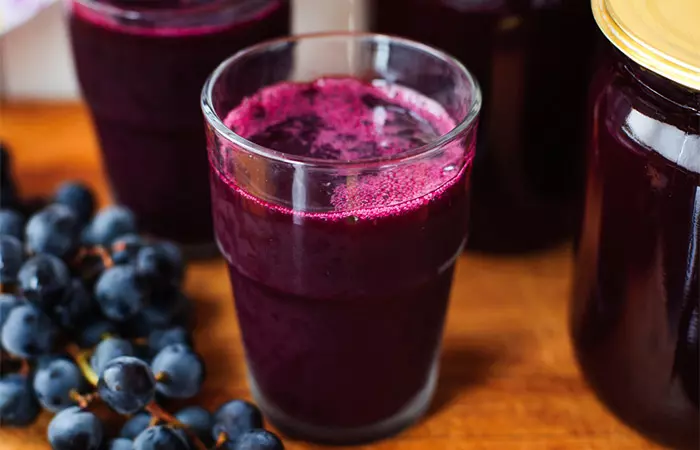
Grape juice made from fresh grapes can be stored in a variety of ways.
You can either freeze it or bottle it for later use. This way, you do not have to run to the store to buy a preservative-choked version or concentrate. You can:
- Refrigerate the juice in jars with tight-fitting lids for 5-7 days. The juice will begin to ferment if left longer.
- Freeze it by pouring the juice into freezer-safe zipper bags and sealing. Store upright only. Double-bag the pouches, just in case a freezer burn happens.
- Label the bags with contents and the date. Freezing this way can keep the juice for almost 1 year.
- Ferment the grape juice into wine by adding sugar and yeast. Keep this mixture aside for 45 to 60 days. You need to check its pH and safety before consuming it.
With the right ingredients, recipe, and storage, you can enjoy grape juice all through the year. It is a versatile drink as you can create your own cocktails/mocktails with it.
Drinking grape juice is the best way to not miss out on the benefits of red grapes, especially for children and adults who can’t eat whole grapes. However, keep in mind that grape juice may also cause certain side effects. Learn more about them in the next section.
Side Effects Of Grape Juice
Grape juice is generally considered safe when consumed in moderation. However, excess intake may cause the following side effects:
- Grape juice is high in sugars, which may cause a rapid increase in blood sugar levels, especially in people with diabetes (26). Research shows that the excess intake of sugar-sweetened beverages may increase the risk of type 2 diabetes (27).
- It is low in fiber content, which does not increase the feeling of satiety the same as the intake of whole fruits (28). In addition, the excess consumption of sugar-sweetened beverages may lead to weight gain in children and adolescents (29).
- The high acidity level of grape juice may lead to dental erosion (30).
- Much anecdotal evidence suggests that grape juice may interact with blood pressure medication. However, limited research is available on this.
The benefits of grape juice are many. It is packed with antioxidants such as resveratrol, tannins, quercetin, and procyanidins that benefit the body in many ways. The juice may help promote gut, brain, and heart health. It may help manage diabetes and support weight loss too. However, there is no standard dosage for grape juice yet. Hence, limit its consumption and seek medical advice if you experience any side effects.
Infographic: Top 5 Benefits Of Grape Juice
Fruit juices are fantastic sources of essential nutrients and tasty to consume anytime of the day. Grape juice is one such delicious drink that is very healthy. Due to its nutritional value, grape juice has been used in traditional medicine for many years. It is full of antioxidants and is ideal for detoxing the body and protecting it against various health issues. Go through the infographic below to learn more about grape juice’s health benefits.
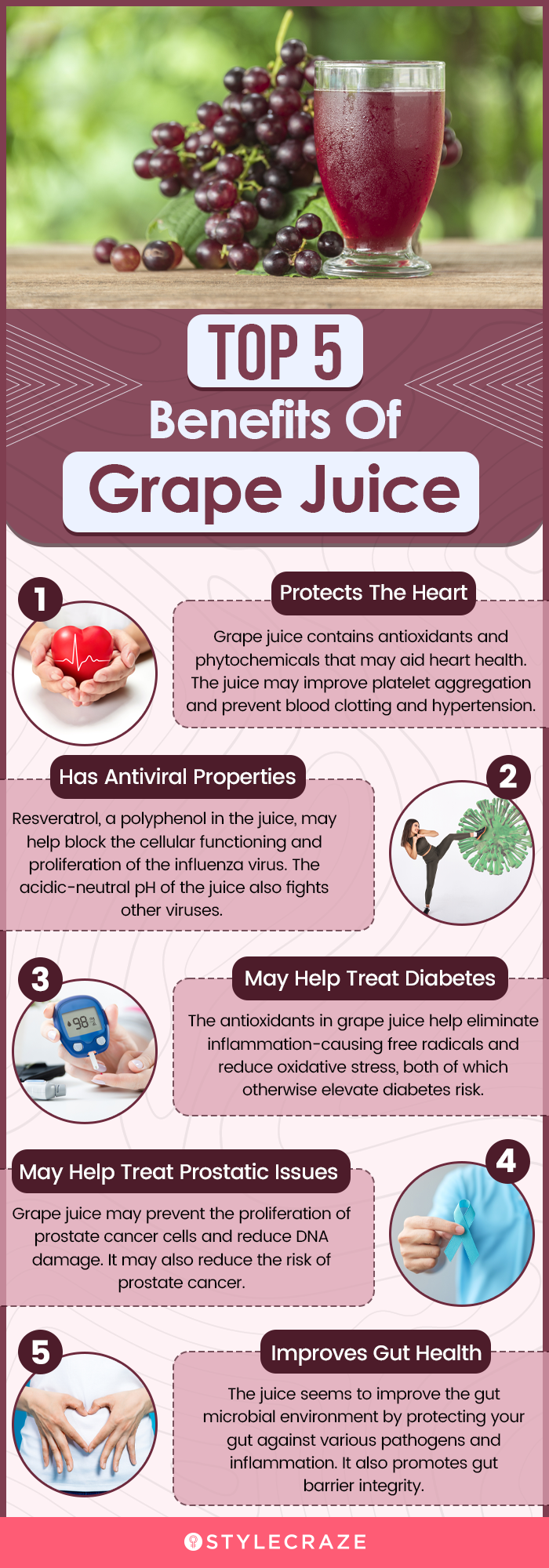
Illustration: StyleCraze Design Team
Frequently Asked Questions
Can grape juice help with hydration?
Yes, grape juice is an excellent choice for preserving fluid balance because of its high water content, which aids in hydration. Additionally, it offers electrolytes and natural carbohydrates that can help maintain hydration and energy levels, particularly after exercising.
Is too much grape juice bad for you?
Drinking too much grape juice could be harmful. The chemicals in grape juice, called polyphenols, may interfere with iron absorption (31). Hence, it is better to consume grape juice in moderate or recommended dosages.
Is grape juice good for your stomach?
Grape juice is good for the stomach. It contains antimicrobial properties that may help kill harmful bacteria (13).
Is grape juice bad for those with diabetes?
According to animal studies, grape juice reduced blood clotting in diabetic rats (32). Drinking grape juice could be beneficial for people with diabetes. However, grape juice is rich in sugars and may spike blood sugar levels. Consult a medical practitioner before including it in your diet (32).
Can too much grape juice cause diarrhea?
Anecdotal reports claim that excess consumption of grape juice or grapes may cause diarrhea. But there is no scientific evidence to back this claim.
Is grape juice a blood thinner?
Grape juice may reduce the risk of blood clots (32). Hence, be cautious if you are on blood thinning medications as it may excessively enhance their effects.
Is grape juice good for weight loss?
Grape juice has fat burning compounds and antioxidants that may help promote weight loss. However, there are no studies where the effects of grape juice on weight loss were observed.
Does grape juice kill stomach bugs?
Yes, grape juice has antibacterial and antiviral properties; it may help kill stomach bugs.
Is grape juice acidic?
Yes, the pH of grape juice is 3. The juice is usually acidic.
Does grape juice help with constipation?
Anecdotal evidence suggests that grape juice may help relieve constipation. However, there is a lack of evidence to support this claim.
Can we drink grape juice at night?
Yes, you can drink grape juice at night.
Illustration: Research Backed Health Benefits Of Grape Juice + Nutritional Value
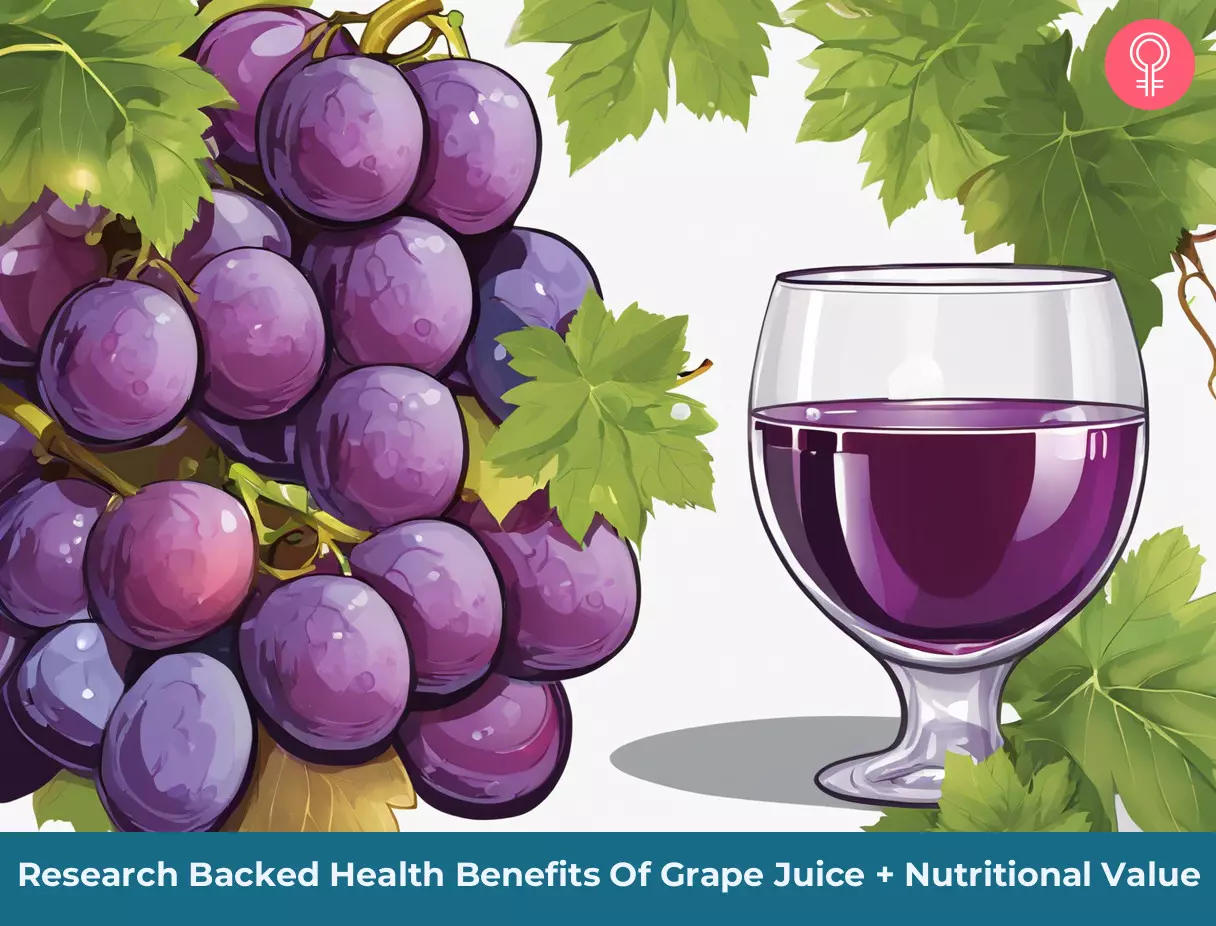
Image: Stable Diffusion/StyleCraze Design Team
Discover the health benefits of grape juice with easy recipes and health tips. Watch this video to learn how to make delicious and nutritious grape juice at home!
Personal Experience: Source
StyleCraze's articles are interwoven with authentic personal narratives that provide depth and resonance to our content. Below are the sources of the personal accounts referenced in this article.
i. I Fasted with ONLY Grapes for 3 Days | My Experience & Resultshttps://www.youtube.com/watch?v=K1PUrTrDGRI
References
Articles on StyleCraze are backed by verified information from peer-reviewed and academic research papers, reputed organizations, research institutions, and medical associations to ensure accuracy and relevance. Read our editorial policy to learn more.
- Grapes and Cardiovascular Disease
https://www.ncbi.nlm.nih.gov/pmc/articles/PMC2728695/ - Dietetic and therapeutic value of grapes and grape juice
https://pubmed.ncbi.nlm.nih.gov/13973406// - Concord grape juice supplementation reduces blood pressure in Korean hypertensive men: double-blind placebo controlled intervention trial
https://pubmed.ncbi.nlm.nih.gov/15630270/ - Concord grape juice supplementation improves memory function in older adults with mild cognitive impairment
https://pubmed.ncbi.nlm.nih.gov/20028599// - Resveratrol Prevents Age-Related Memory and Mood Dysfunction with Increased Hippocampal Neurogenesis and Microvasculature and Reduced Glial Activation
https://idp.nature.com/authorize?response_type=cookie&client_id=grover&redirect_uri=https%3A%2F%2Fwww.nature.com%2Farticles%2Fsrep08075 - Biochemical Analysis and in Vivo Hypoglycemic Activity of a Grape Polyphenol–Soybean Flour Complex
https://www.ncbi.nlm.nih.gov/pmc/articles/PMC3419343/ - Resveratrol supplementation improves glycemic control in type 2 diabetes mellitus
https://pubmed.ncbi.nlm.nih.gov/22901562// - Anticancer and Cancer Chemopreventive Potential of Grape Seed Extract and Other Grape-Based Products
https://www.ncbi.nlm.nih.gov/pmc/articles/PMC2728696/ - Cancer chemopreventive pharmacology of phytochemicals derived from plants of dietary and non-dietary origin: implication for alternative and complementary approaches
https://link.springer.com/article/10.1007/s11101-014-9341-9 - Effect of concord grape juice on chemotherapy-induced nausea and vomiting: results of a pilot study
https://pubmed.ncbi.nlm.nih.gov/20189927// - Potential Anticancer Properties of Grape Antioxidants
https://www.ncbi.nlm.nih.gov/pmc/articles/PMC3420094/ - Inhibition of prostate cancer growth by muscadine grape skin extract and resveratrol through distinct mechanisms
https://pubmed.ncbi.nlm.nih.gov/17804756// - Dietary Polyphenols Promote Growth of the Gut Bacterium Akkermansia muciniphila and Attenuate High-Fat Diet–Induced Metabolic Syndrome
https://www.ncbi.nlm.nih.gov/pmc/articles/PMC4512228/ - Antiviral Activity of Resveratrol against Human and Animal Viruses
https://www.ncbi.nlm.nih.gov/pmc/articles/PMC4676993/ - Virus inactivation by grapes and wines.
https://www.ncbi.nlm.nih.gov/pmc/articles/PMC170457// - Nutritional Approaches for Managing Obesity-Associated Metabolic Diseases
https://www.ncbi.nlm.nih.gov/pmc/articles/PMC5511693/ - Mechanisms by which dietary ellagic acid attenuates obesity and obesity-mediated metabolic complications
https://www.researchgate.net/publication/286085095_Mechanisms_by_which_dietary_ellagic_acid_attenuates_obesity_and_obesity-mediated_metabolic_complications - Nutritional Approaches for Managing Obesity-Associated Metabolic Diseases
https://www.ncbi.nlm.nih.gov/pmc/articles/PMC5511693/ - Potential of herbs in skin protection from ultraviolet radiation
https://www.ncbi.nlm.nih.gov/pmc/articles/PMC3263051/ - Fruit juice drink production containing hydrolyzed collagen
https://www.sciencedirect.com/science/article/abs/pii/S1756464615000869 - Antioxidant activities of fresh grape juices prepared using various household processing methods
https://www.ncbi.nlm.nih.gov/pmc/articles/PMC6049554/ - Regular consumption of concord grape juice benefits human immunity
https://pubmed.ncbi.nlm.nih.gov/21138361/ - Purple grape juice supplementation in smokers and antioxidant status according to different types of GST polymorphisms
https://www.ncbi.nlm.nih.gov/pmc/articles/PMC4306655/ - Biological Activities of Polyphenols from Grapes
https://www.ncbi.nlm.nih.gov/pmc/articles/PMC2852857/ - Grape juice, purple, with added vitamin C, from concentrate, shelf stable
https://fdc.nal.usda.gov/food-details/2003592/nutrients - Grape juice canned or bottled unsweetened without added ascorbic acid
https://fdc.nal.usda.gov/food-details/173042/nutrients - Sugar and artificially sweetened beverages and risk of obesity type 2 diabetes mellitus hypertension and all-cause mortality: a dose-response meta-analysis of prospective cohort studies
https://pubmed.ncbi.nlm.nih.gov/32529512/ - The Role of Fiber in Energy Balance
https://www.ncbi.nlm.nih.gov/pmc/articles/PMC6360548/ - Sugar-Sweetened Beverages and Obesity Risk in Children and Adolescents: A Systematic Analysis on How Methodological Quality May Influence Conclusions
https://pubmed.ncbi.nlm.nih.gov/26194333/ - Evaluation of the erosive capacity of children’s beverages on primary teeth enamel: An in vitro study
https://www.ncbi.nlm.nih.gov/pmc/articles/PMC5937962/ - Bioactive dietary polyphenols inhibit heme iron absorption in a dose-dependent manner in human intestinal Caco-2 cells
https://pubmed.ncbi.nlm.nih.gov/22417433/ - Moderate Red Wine and Grape Juice Consumption Modulates the Hydrolysis of the Adenine Nucleotides and Decreases Platelet Aggregation in Streptozotocin-Induced Diabetic Rats
https://link.springer.com/article/10.1007/s12013-012-9407-5
Read full bio of Thais Tisatto
Read full bio of Ravi Teja Tadimalla
Read full bio of Arshiya Syeda
Read full bio of Aparna Mallampalli





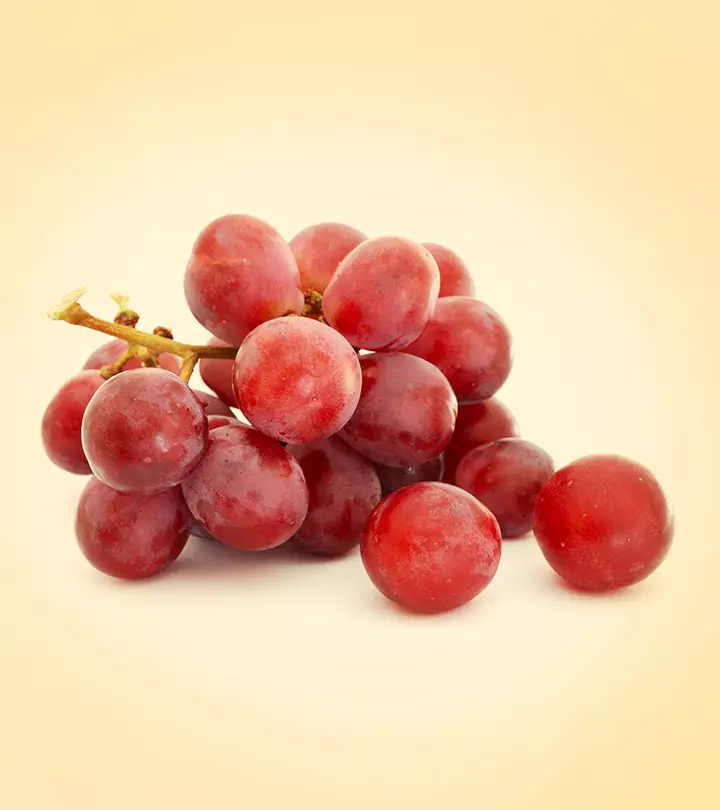
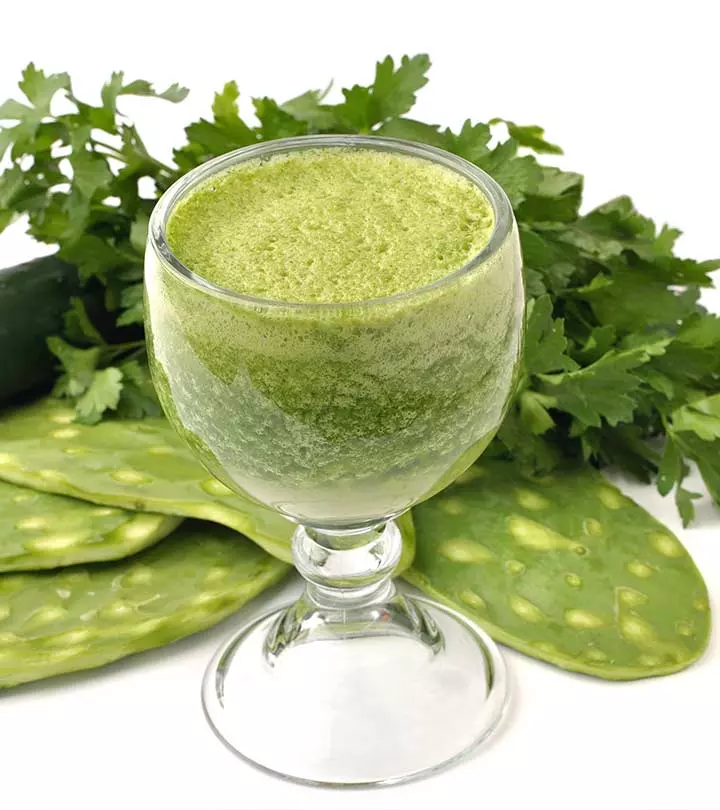
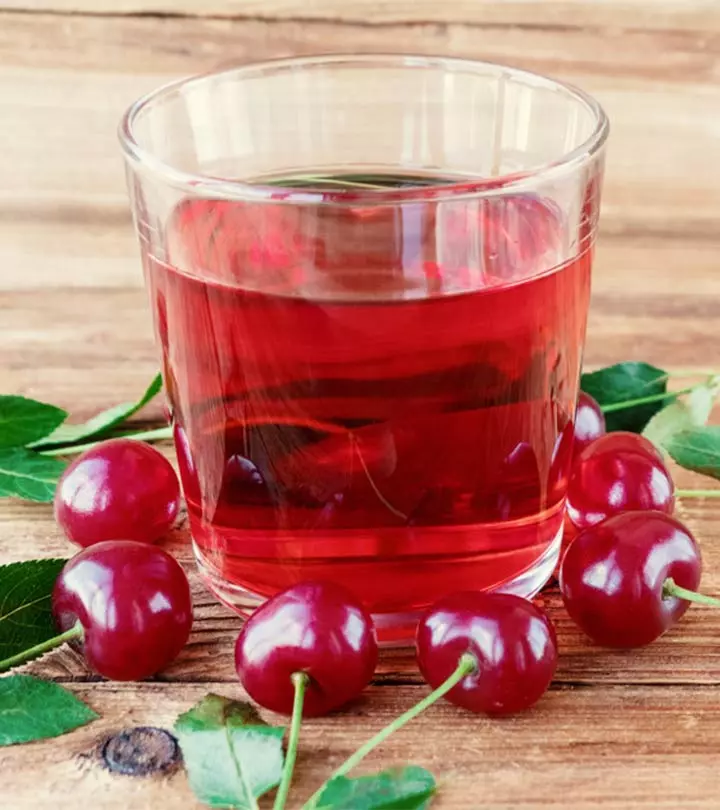

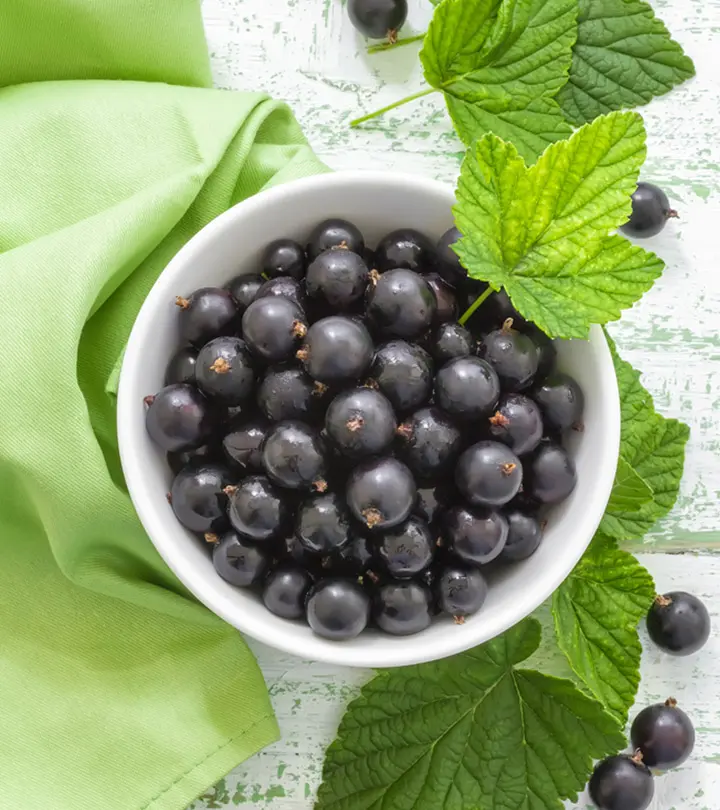
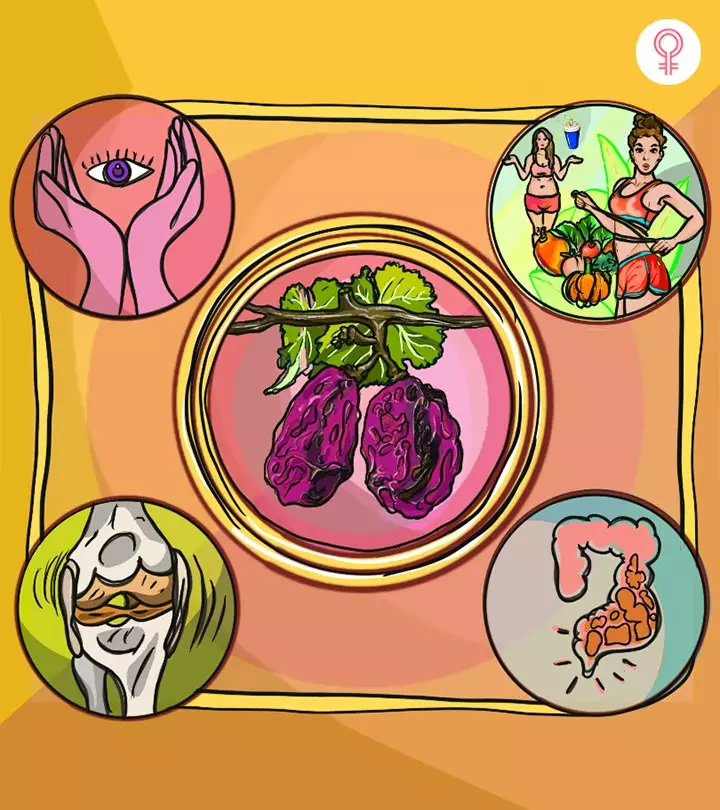
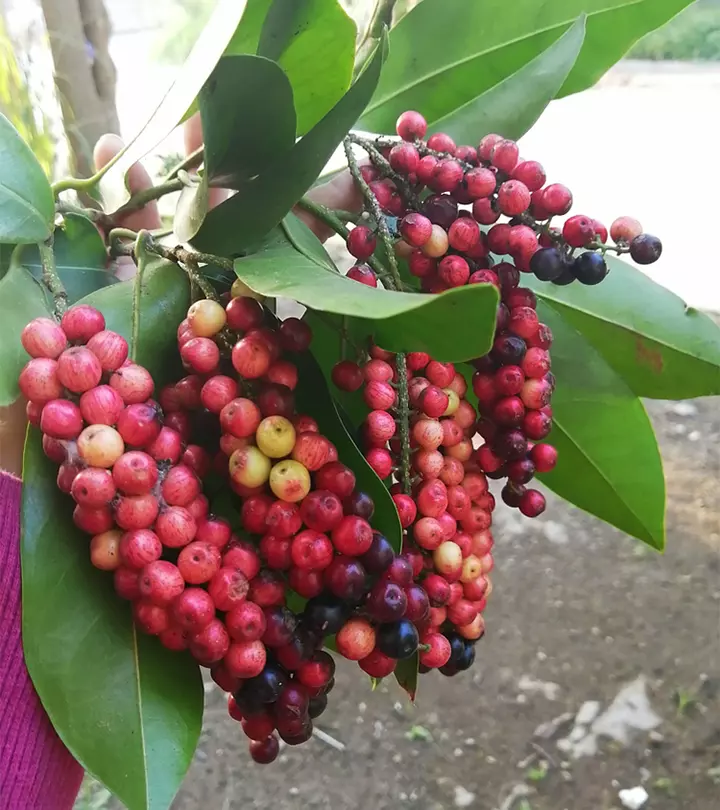
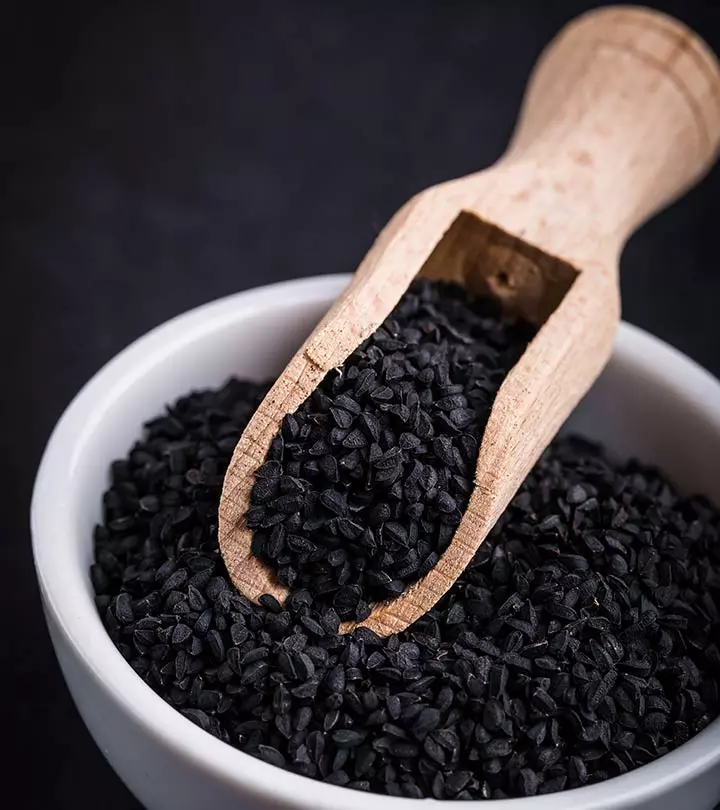
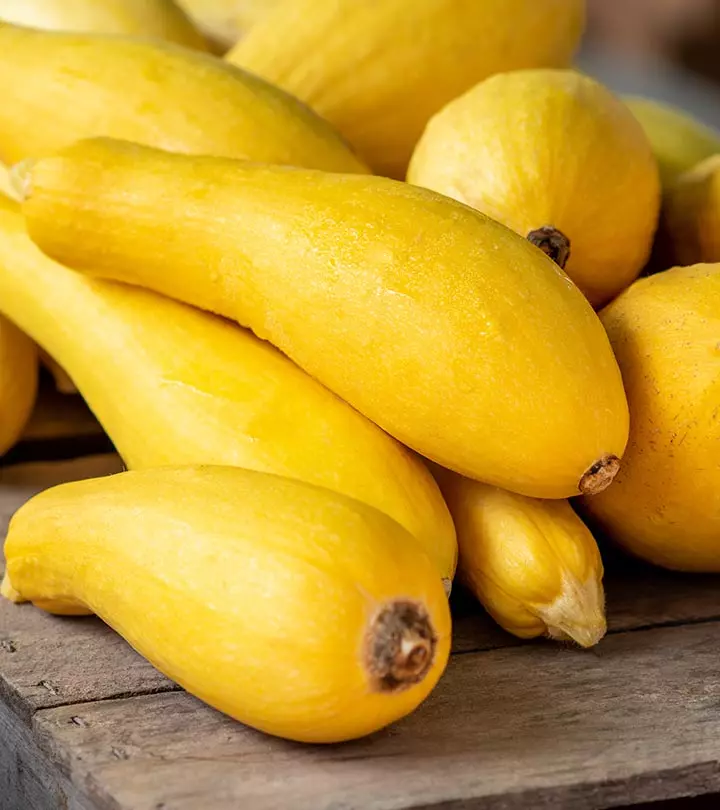
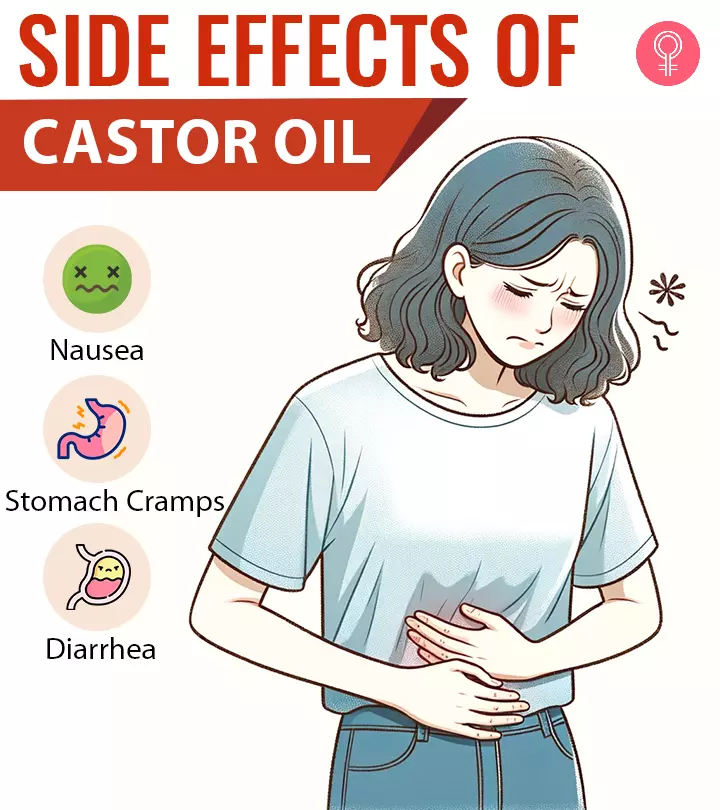
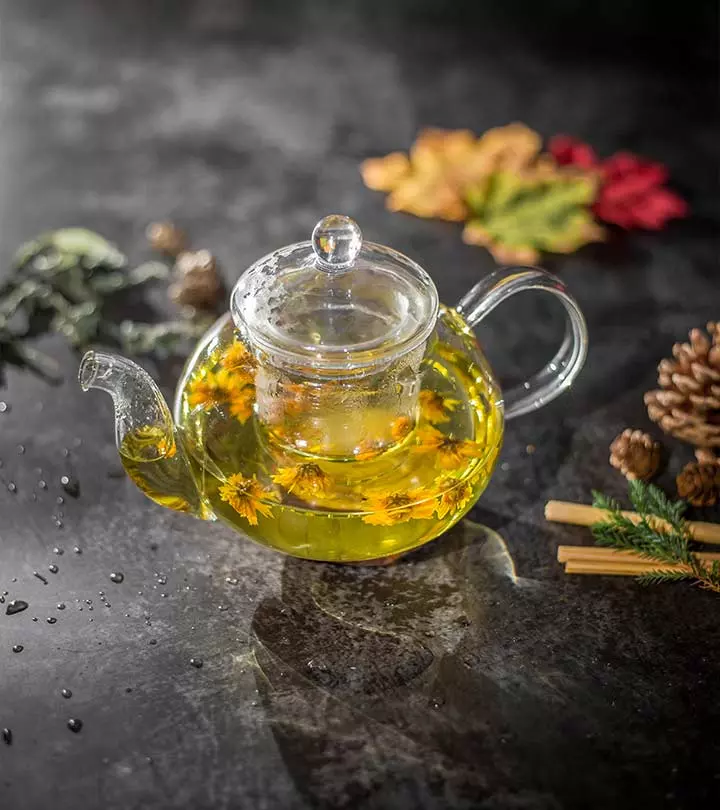
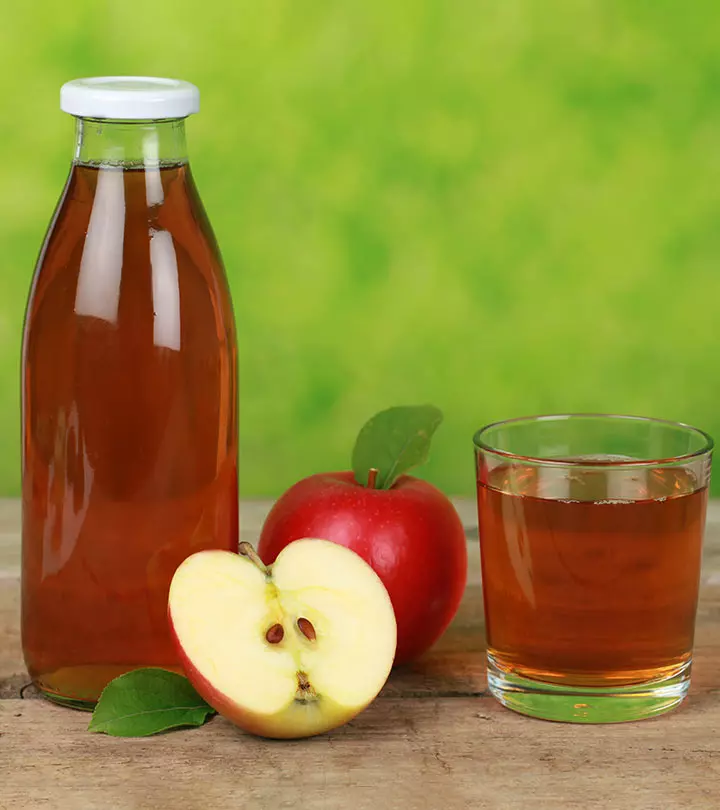


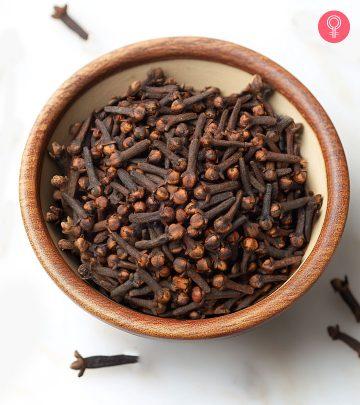
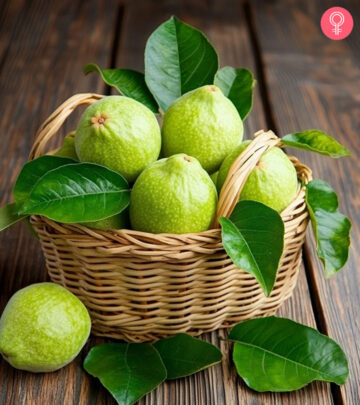
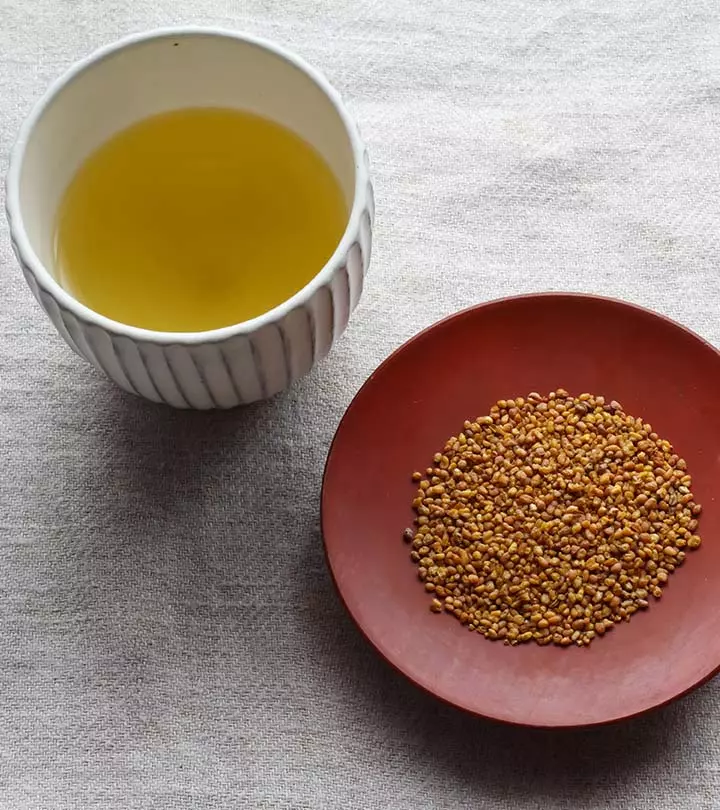
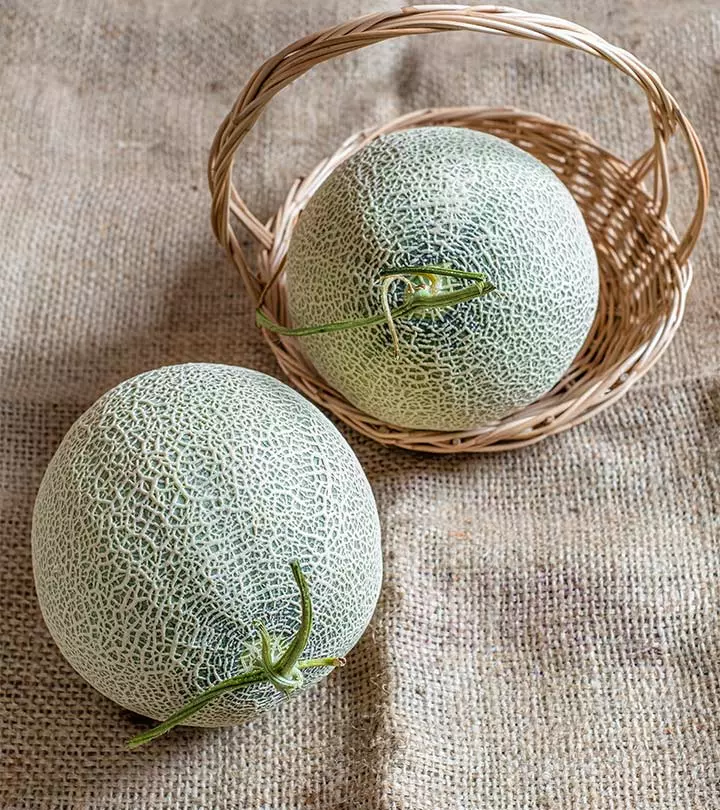
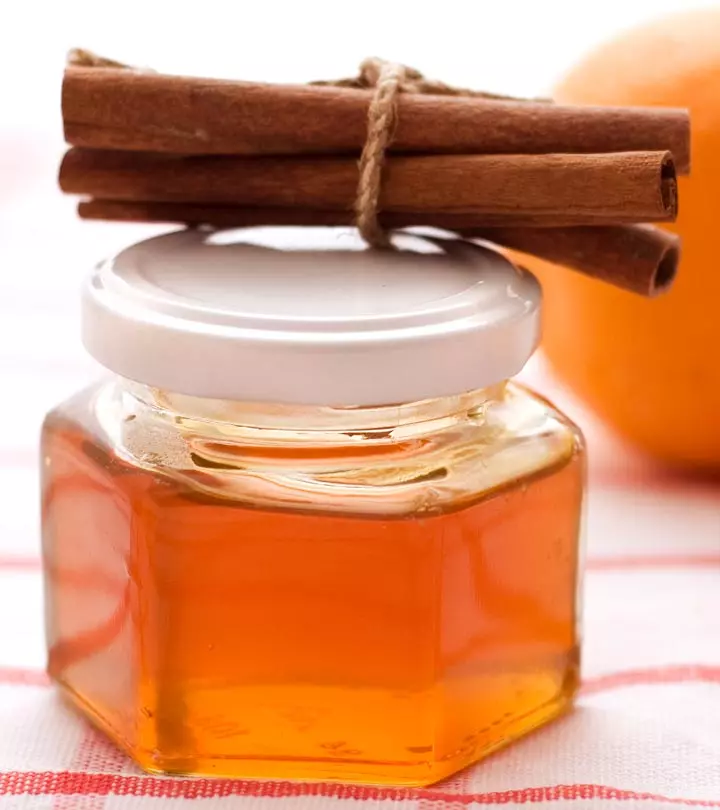

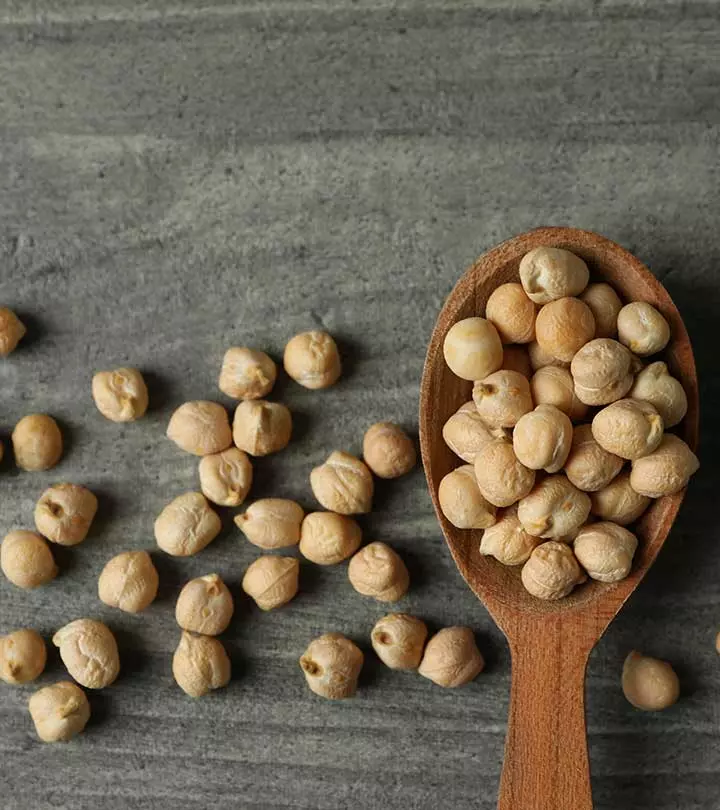
Community Experiences
Join the conversation and become a part of our empowering community! Share your stories, experiences, and insights to connect with other beauty, lifestyle, and health enthusiasts.